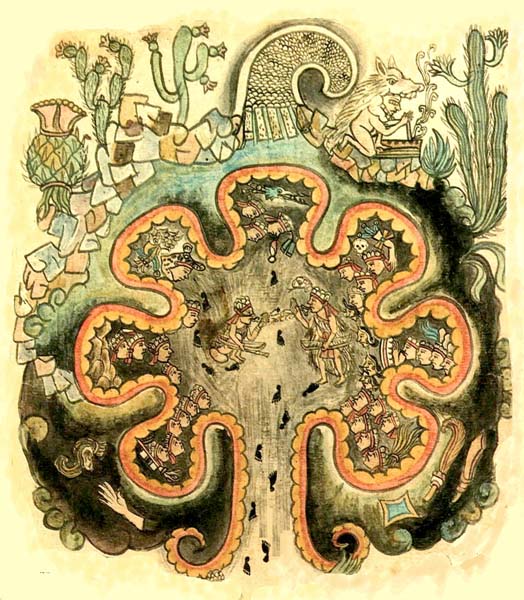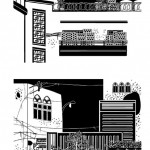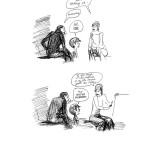February 28th, 2010 § § permalink
Sometimes people ask me: what do you do all day long as a freelancer?
Actually, no one ever asks me that, though I wish the cute girl at the far end of the bar would. (The universal, hypothetical cute girl, of course—a figure more rhetorical than gorgeous, made less for romance than the purposes of argument—in the bar I rarely actually go out to.) Most people hear I’m a freelancer and, aside from the standard envious comment about how nice it must be to work from home, are generally content to leave it at that. On the rare occasion when they do press further, I unfailingly find whatever account of I give of how I spend my time comes out sounding inadequate, much as ledgers fudged to hide fraud look in a court of law.
Which is not to say I haven’t clear memories of fiendishly productive days as a freelancer, days best characterized by dispatch and alacrity, in which tasks were no sooner started than successfully wrapped up, but that any honest appraisal sees these days for the exception they are, rather than the rule I wish they were.
Such that the question of how I spend my days is, really, the kind of question I’m always asking myself, from the moment I, an esprit descending an escalier, leave the bar, to those moments between tasks when hands stop their puttering and a space suddenly opens for reflection on action (“What am I doing?â€). It is the kind of question a perennially guilty conscience, wishing to dispel the misplaced envy of people convinced freelancing is a breeze, is always putting to me (“No, you see, but it’s really—â€). It is the kind of question that hits you when, leaning back in your chair for a stretch and a yawn, you see dusk has crept up on you already, and the impression of not having done a thing truly useful and fulfilling is as certain as the impression of having been busy every minute: for where, where has the day gone? » Read the rest of this entry «
February 21st, 2010 § § permalink
doesn’t come to most of us before the age of five, when the sense of an internal self has begun to take root. Lying in this context becomes a measure of sophistication: to make a lie believable the liar must understand the mind of the person he is deceiving. In an experiment that Gopnik cites, children are shown a closed box and told that there is a toy inside. But they mustn’t look for themselves. The experimenter leaves the room and naturally the children peek in the box. When the experimenter returns the three-year-olds insist that they haven’t looked in the box and in the same breath tell the experimenter what was in it. Five-year-olds, however, are able to carry off the deception…
This chasm between the perceptions of three-year-olds and five-year-olds reveals a great deal about how children’s consciousness changes as they develop a sense of personal, autobiographical memory and consecutive time. Prior to the age of five, children appear to experience time in a different manner. They are perfectly capable of ‘forgetting’ events that they experienced a minute ago, as well as their mental state when the experience occurred. They seem to think associatively, closer perhaps to the hypnagogic state that one drifts into just before falling asleep, than to one that is ordered around a timeline with a past, present, and future.
~ Michael Greenberg, “What Babies Know and We Don’t” (review of Alison Gopnik’s The Philosophical Baby in NYRB)
February 15th, 2010 § § permalink

The mythical origin of the “nahuatlaca” tribes. From the “Historia Tolteca chicimeca”. A postcortesian codex from 1550, written by the people of Cuauhtinchan (of chichimeca ancestry) to sustain their right to their lands, under the Spanish autorities. They wrote their history from A.D. 116 through 1544, using a mixture of European and prehispanic styles. (courtesy Wikipedia)
February 6th, 2010 § § permalink
At Words Without Borders, in their annual Graphic Lit issue. Stunning pages by Beirut native Zeina Abirached lend warfare a formalist rigor in an excerpt from her memoir A Game for Swallows.

There’s also a section from That Was Happiness by Blutch, one of France’s leading cartoonists, whose illustrations have appeared in Libération, The New Yorker and Les Inrockuptibles. He was awarded the Grand Prize at the 2009 Angoulême comics festival.

In a subtitled video segment at the WWB blog, the artist discusses influences on the book.
February 5th, 2010 § § permalink
Often, while trying to maximize the multitasking efficiency of my kitchen perambulations during the meal prep and cleanup that are my brief reprieve from a solitary, deskbound life of translation—picture me going almost half moon pose to stow forks in a drawer while kicking shut the newly full dishwasher, or with divided mind hooking a foot in the refrigerator door even as I stir a pot’s contents to assuage their seethe and boil—I think of the little “waking-up†ballet that opens An American in Paris (and begins around 3:22 of this clip):
watch?v=zhYSDgCTaPQ
Gene Kelly greeting the day with a graceful transformation of his garret from bedroom to studio. With a hoist or a nudge, furniture emerges and vanishes, folding out or away; the whole room has that cleverness of train compartments, close nautical quarters, or those tricky Japanese pencilboxes all the rage when I was a grade schooler—press a button and a spring-loaded drawer slides open, another and out pops the pencil sharpener—somehow specifically pleasing and ingenious to children (and later in life to childlike designers). Perhaps because they promise interiors their size and unassuming outsides belie; perhaps because there is something magical about transformations, when we are young enough that not to see a thing is to doubt it exists; perhaps because they traffic in secrets and seem to increase the world’s store of hiding places; perhaps because they are small and we are small. Perhaps it is as simple as that.
February 4th, 2010 § § permalink
The minds behind the former Athanasius Kircher Society, that wondershow of cabinets and other items of curiosity where I whiled away so many pleasant hours as an unhappy temp, returned last summer with the Atlas Obscura, a site to celebrate eccentricities, ephemera, and esoterica. (Since digression is the sunshine of exactly the sort of narrative the defunct Society would appreciate, may I add that it was named for the “Jesuit Leonardo da Vinci,” who also happens to be the hero of the biography-within-a-novel in Jean-Marie Blas De Roblès’ recent French Voices grant winning novel Là où les tigres sont chez eux.)
Atlas Obscura is now sponsoring the exciting Obscura Day, an “international celebration of wondrous, curious, and esoteric places.” From their site:
When and where?
We are celebrating Obscura Day in cities and towns all over the world! Saturday, March 20th 2010. Mark your calendar. These events may fill up fast, so RSVP at the link above. We are not charging anything to attend, but certain venues may charge admission.
February 3rd, 2010 § § permalink
First La Fraise rips off Threadless, and now this, which is already eons old in internet years.
Utopod: of use to all you SFF geeks working on your French, or those who have mastered it already and seek entertainment.
February 1st, 2010 § § permalink
in May. I have been advised by a good friend to make official announcement in the most direct and unadorned language possible, forsaking coy allusion and mandarin indirection. My good friend is right. He is also very smart, and a lawyer. So in case this has not been made clear by earlier posts, here goes:
Entitled A Life on Paper, this book is a collection of short stories spanning the career, to date, of French fabulist Georges-Olivier Châteaureynaud, selected and translated by me. This will be the author’s first book in English. It was recently selected for the French Voices grant program, and also received a Hemingway Grant from the French Embassy.
It will be published by Small Beer Press, and the (awfully nice) hardcover is available for pre-order at their site. If you are a buyer for a bookstore, the ordering information is here. Apart from the obvious ways in which buying this book will support author and publisher, I am told that at this stage pre-orders will help build buzz for the book leading up to its release, getting the word out there and maybe even helping with sales to stores by proving interest. Apparently the book is now also listed at a number of online retailers such as Barnes & Noble, Amazon, Flipkart, eCampus, and aggregator sites like Allbookstores. It is also up at Goodreads for rating and recommending.
If anyone has suggestions on how best to help Small Beer in promoting and marketing this book, including nifty or unexpected strategies and venues, I’m all ears. Crowdsource: activated!
I have been translating Châteaureynaud’s work for 5 years now. I am overjoyed that what began as a labor of love is finally seeing the light.


